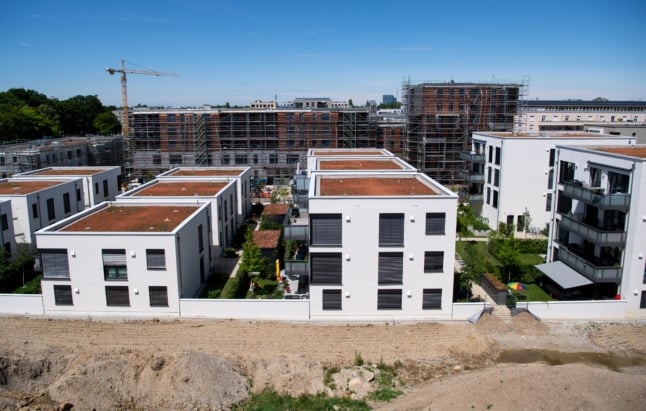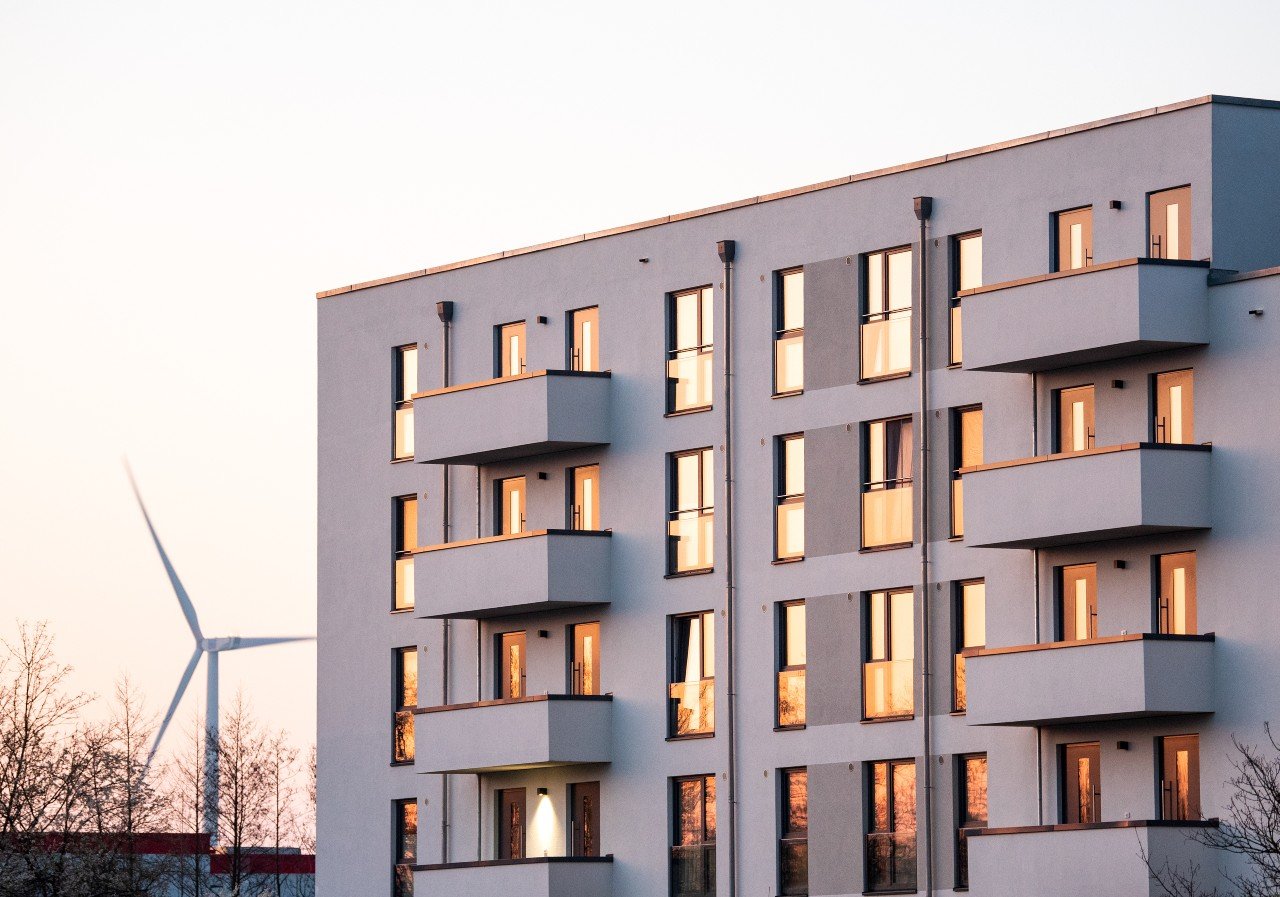What’s going on?
Munich’s city council plans to bring a new law into force in August to ensure that the vast majority of newly built properties are rental properties, according to a report by regional broadcaster RB24.
The council, which is run by a coalition of Green Party and Social Democratic Party (SDP) councillors, also wants to ensure that a large proportion of these rental properties offer affordable rents of between €10-15 per square meter – a vast improvement on the current €17 square metre average flat price.
To achieve this, the so-called Green-Red coalition will put in place what RB24 have termed a “complex points system… with multiple components”.
When a housing construction firm or investor applies for planning permission, the council will award them points based on a number of different factors.
These include the proportion of subsidised apartments, the proportion of rental apartments, a 40-year commitment period, the infrastructure fee, the proportion of building land sold to the city and the proportion of building land sold to cooperatives.
The more affordable and rental homes they promise to build, the more points they are awarded – with 100 points being the minimum requirement for a green light to build.
In addition, developers will be encouraged to sell off some of their land to the council or housing co-operatives.

A Munich housing co-operative. Co-op houses will remain an important part of the city’s affordable housing policy. Photo: picture alliance/dpa | Sven Hoppe
READ ALSO: German housing co-ops: What are they and how do I sign up?
What are they trying to achieve?
With the new system in place, the council thinks they’ll be able to have a much greater influence over the type of homes being build in the city, which it hopes to push heavily in the direction of rentals that people can afford.
In order to secure planning permission and make a profit, the council estimates that developers will generally opt to build around 80 percent rental properties, of which 60 percent will be social or low-cost housing.
If four in five new properties built in the Bavarian capital are rentals, this would set the city apart from everywhere else in Germany, the council claims.
Ok, but why is this even necessary?
Housing prices have been soaring in Munich in recent years, while the stock of rental flats has increasingly declined.
While in 2008, the average price of a rental apartment was €10 per square meter, this had shot up to €17 per square meter in 2020. And though the city lost its title of ‘most expensive German city’ for the first time in two decades in 2018 (it’s now Stuttgart), the city and four of its suburbs continue to feature in the top 10 most expensive rental areas.
READ MORE: Housing: How did it get so expensive to live in Munich?
Though population growth and interest rate stagnation have played a role in this, there have also been mass sell-offs of rent-controlled apartments to private investors, which has naturally contributed to the scarcity of affordable flats in the city.
Now, the Greens and SDP want to rectify this.
Doesn’t Munich already have strict planning laws in place?
It does – although the new plans are far more ambitious than their predecessors.
Munich’s existing law – Socially Just Land Use (or SoBoN for short) – also relates to how property developers are awarded planning permission and has been in place since 1994.
Whenever an investor wants to build a big apartment block, for example, they’re expected to pay a surcharge per square metre that can be used for social projects in the city that benefit the greater good, like social housing or a daycare centre.
READ ALSO: It’s not impossible: How to find housing in Munich
In recent years, this surcharge has been €100 per square metre, and since 2017, investors have had to include a 40 percent quota of rental flats in each of their developments.
From August, however, the council wants to implement a new version of SoBoN which will pull in an average of €175 per square metre from developers and double the rental property quota to 80 percent of a development.
That’s quite a big change – what are the developers saying?
As you might expect, the developers don’t seem thrilled by the prospect of the additional costs and regulatory burdens.
Speaking to BR24, Patrick Slapal, the CEO of the Bavarian branch of Federal Association of Independent Real Estate and Housing Companies (BFW), said the plans would create a “bureaucratic nightmare” that would “hinder the construction of affordable properties”.
The latest version of SoBoN, which came into force in 2017, was meant to last at least a decade, but is now being replaced after four years, he added.
The BFW – which represents medium-sized housing developers – plans to conduct a study to assess the scale of the damage that the new requirements and costs may do to this type of business.
What are the SPD and the Greens saying?
In a press release on the reforms, Christian Müller, head of Munich’s SPD fraction, called the move a “quantum leap” that would benefit “all citizens”.
“We’ll achieve many more affordable apartments – and above all apartments that offer long-term security – so that Munich remains a city for everyone, not just for people who are high-earners.”
Die Bau- und Immbilienwirtschaft muss sich an der Schaffung von bezahlbarem Wohnraum beteiligen. Das stellen wir mit unserem neuen Modell sicher. Wie wir den Wohnungsbau in #München genau reformieren werden, könnt ihr hier nachlesen: @GrueneRathaus_M @Tuelli @anuka76 pic.twitter.com/EIWDvSNJh7
— SPD/Volt Fraktion im Münchner Rathaus (@RathausSPD) July 7, 2021
Their coalition partner, the Greens, also had high hopes for the new planning system.
“The new SoBoN is not simply a continuation, but an innovative approach that combines its goals – more subsidised housing, significantly more rental housing and longer commitments – in a points-based system,” said Green Party fraction leader Anna Hanusch.
“We’re implementing our goal of transferring up to 50 percent of the space to the city not as a mandatory requirement, but rather providing strong incentives [to do so]. That’s how are securing affordable, subsidised living space for urban society in the long term, despite fairly empty coffers.”
Have other political parties weighed in on this?
The Christian Social Union (CSU) – the Bavarian sister party to Merkel’s Christian Democratic Union (CDU) – joined the developers in criticising the plans.
The move is likely to scare off the exact developers who have been responsible for building 90 percent of affordable housing in the city in recent years, they said.
Haven’t other cities tried to make housing more housing affordable?
Yes, it’s a big battleground in German cities. Berlin brought in a five-year rent freeze in 2020, but it was, infamously, deemed null and void by the federal constitutional court in April this year. It led to tens of thousands of Berlin tenants facing immediate price hikes on their rent and back payments, often costing thousands of euros.
READ ALSO: ‘Stressed and depressed’: How Berlin’s rent cap fiasco has affected foreign tenants
Now a grassroots group with the aim of trying to socialise homes belonging to large landlords has gained massive support. The “Expropriate Deutsche Wohnen & Co.” initiative managed to get enough signatures to hold a referendum. Berliners will vote later this year on whether to force major property companies to sell thousands of their flats to the city.







 Please whitelist us to continue reading.
Please whitelist us to continue reading.
The new planning law in Munich is not particularly radical. Local authorities across Europe use similar mechanisms to extract ‘planning gain’ across development sites. It may be straight forward social benefits. This happens in the UK but there has to be clear relationship to the development, typically transport infrastructure. Also local authorities tie in mechanisms to extract a substantial proportion of social housing. In the UK this was typically a percentage of ‘affordable housing’ , but percentages of large and small units can also be applied. In countries like the Netherlands, Councils often make sure they keep land ownership whilst the new build is leased out. This way they can enforce greater control of rents.
Of course developers supported by politicians, such as the CDU/CSU in Munich, will argue that such policies or controls will dissuade developers from developing. But the bottom line in somewhere like Munich, is that everyone knows there is a massive demand for housing. Ultimately, the laws of demand and supply decide.
The main problem is that NOT SINGLE ONE of the German parties has a plan do create “Affordable housing”. The state should build apartments for regular families (with average income) for normal price.
Currently – developers are building new apartments for investors mainly – the new apartments are too expensive for the most of the german citizens / residents.
But currently – no political party seems to care about providing affordable housing for the majority of its people. The politicians seem to only care about deep pocket investors … they do not think about regular families…
Basic math says that assuming a reasonable 3% yield you need to be able to build a 100 sqr mtr apartment for around 400,000. So with property averaging twice that it will always be a challenge. Of course the other thing is building standards and general inflation means the cost of building has dramatically increased in the last decade.